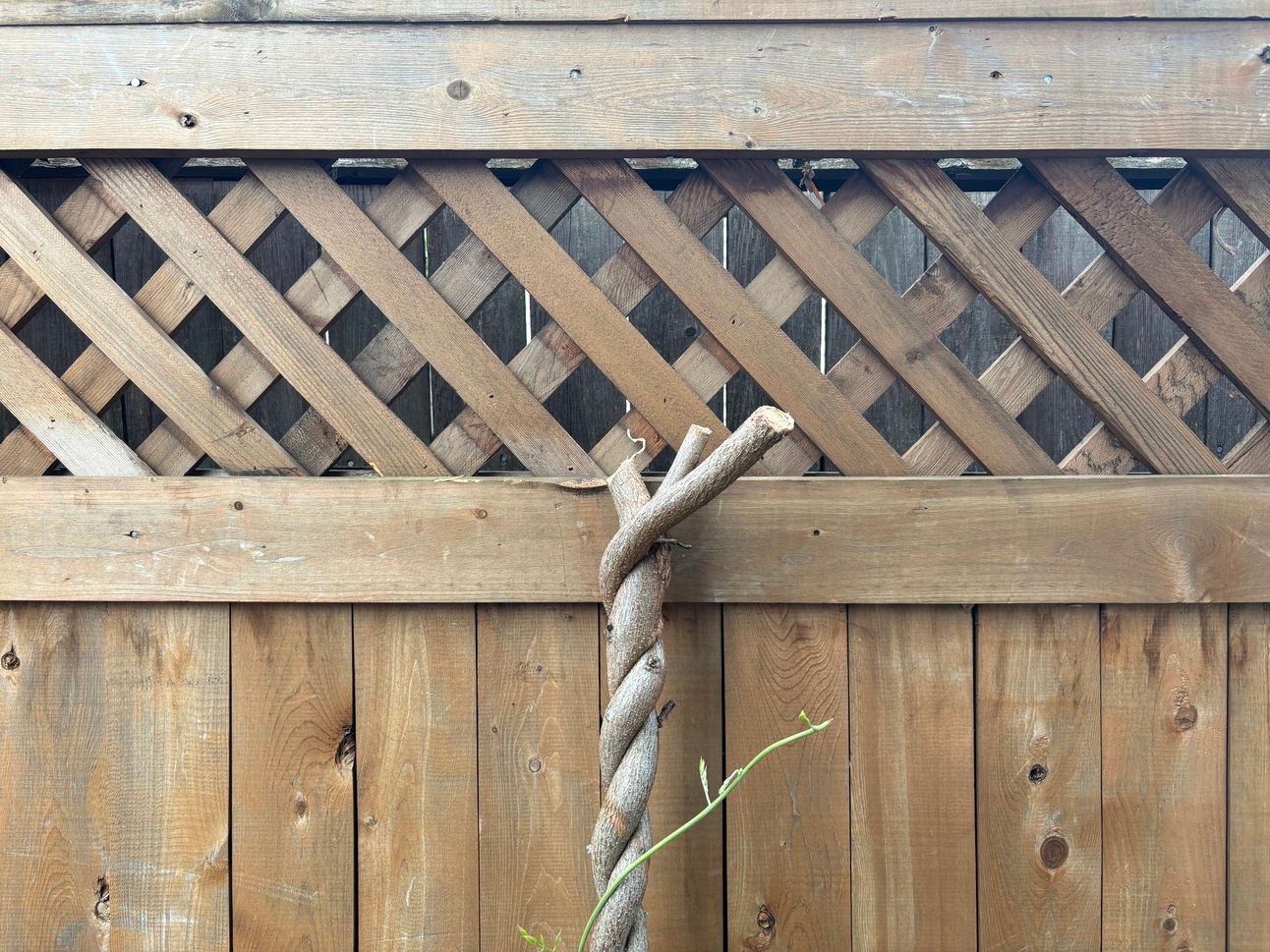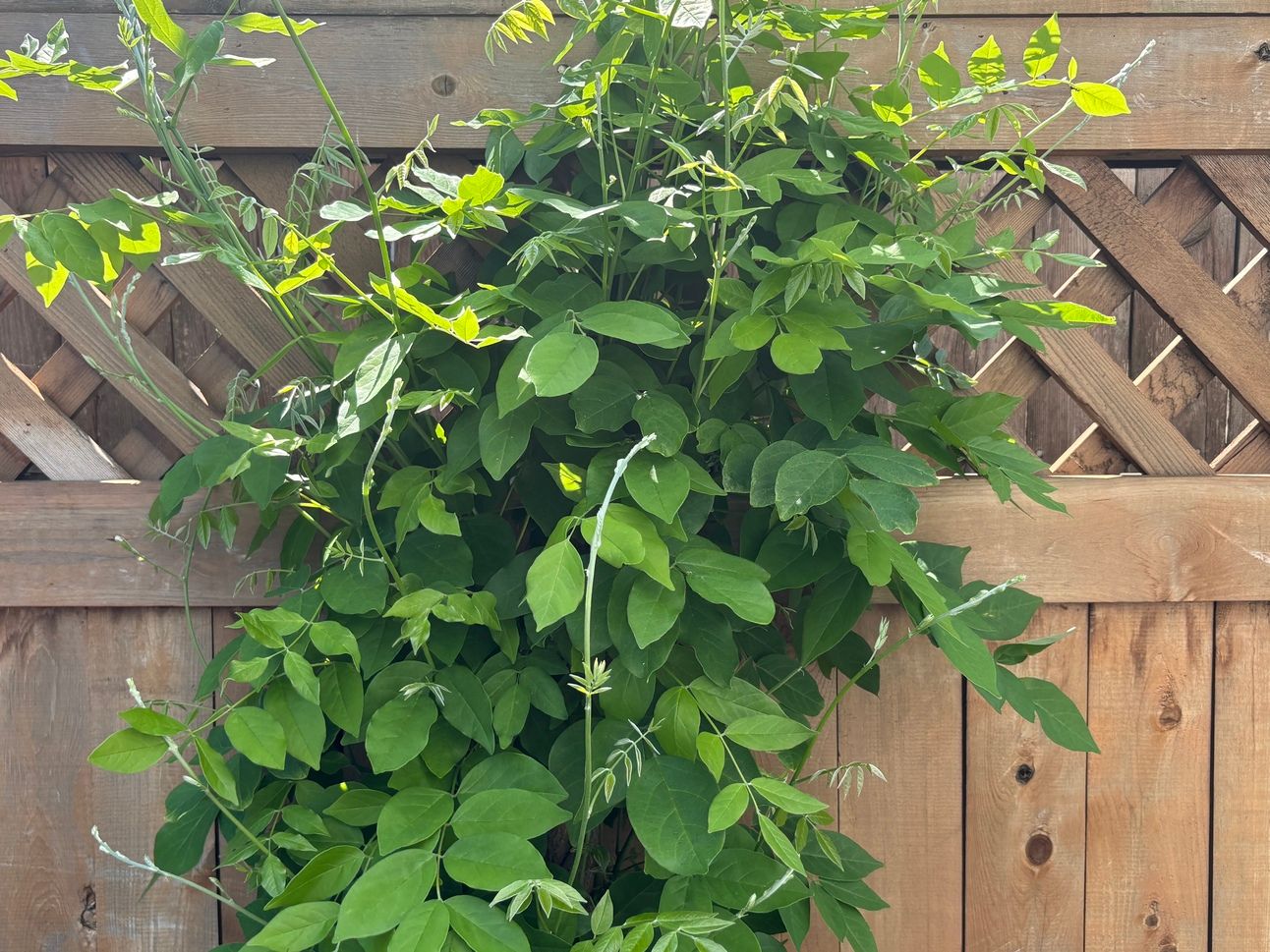- The Future Is Like Pie
- Posts
- Bare as Eden
Bare as Eden
The Future Is Like Pie #54
there will be no poison anywhere, no plague
in the sky and there will be a mother-broth
for all of the people and we will
never die, not one of us, we’ll go on
won’t we?
They say that gardening is an act of hope—that, by planting and cultivating and weeding, one is practicing hope, anticipating a future in which there will be a harvest. How can one possibly plant tulip bulbs and tend tomatoes while also giving in to despair?
Hold my beer.
Despair is so attractive right now that, well, it’s hard to write. I’ve tried a few versions of this issue and almost every time the words choose a fairly dark path. I don’t think it serves either of us for me to give into that impulse.
Instead, let me lament my wisteria. We have—had—the loveliest wisteria vine in the side yard, its trunk braided and running up the fence, where it then split off in either direction to weave in and out of the fence-top lattice. It produced beautiful pale indigo blooms in heavy fist-sized clusters, usually with two rounds a season.
Unfortunately, earlier this summer, we realized it had grown too powerful: the vine had thickened and was forcing the lattice apart. To salvage the fence, we had to destroy the wisteria. Cutting it out and repairing the lattice was both a demanding chore and a small heartbreak.

Ouch.
Sometimes gardening means killing things. Is that a metaphor? Is that a kind of hope?
I don’t know. It doesn’t have to be anything, actually, beyond a sign that maybe we should have planned better. Should we have skipped wisteria? Planted it in a different spot? Taken better care to position the vines?
I suppose we’ll find out:

After just a few weeks of growth, from almost nothing.
I guess this is a metaphor whether I like it or not: that pruning is necessary and healthy, that everything has a cycle, that life finds a way, take your pick. Plants are good at grounding us. They don’t know what a government is. They grow and die and wreck your fence and die and grow some more. As we cut back the wisteria, the lilies popped off, and some unexpected crocosmia bloomed, and the zucchinis decimated by squash borers last year have already given us seven fruits this year. There’s always something growing. Even when you’re not looking, or trying, or hoping.
Unbreaking
I am extremely pumped to be following the deeply necessary and pragmatic work of Unbreaking, a site that tracks “how the administration is breaking the government, and what that means for all of us.” It’s not journalism—it’s well-written synopses of exactly what’s going on right now, based on credible sources. I cannot stress enough how valuable this site is for understanding what’s happening to the federal work force, healthcare, food safety, and pretty much every other pillar of society—so please check it out, and if your bandwidth allows, consider helping out too.
“The Invention of Memory”
I appreciated this piece from Emily Dupree—published last summer but still relevant—on the way society has, as a coping strategy, all but forgotten the pandemic, and what that means for those of us trying to survive it:
The innocuous imperfection of memory is not my target. Some of these oblivions do more than just reflect our imperfect memories back to us—they instead show us the ways we cannot grapple with the present, cannot cope with what we have failed to do. This is, I believe, at the heart of pandemic memory: it is a way we have rewritten the past so that we may continue rewriting the present. For the present conditions are terrible—over one million people are getting infected with Covid each day, a thousand are dying each week, sixteen million have Long Covid, our children are cognitively disabled from repeat infections, and there is no end in sight. The way we cope with these facts, with our responsibility for these facts, is by rewriting their causes.
“When He Calls Your Name”
I don’t often recommend fiction here, but do check out this compelling, ambient-spooky short story from Catherynne Valente. There’s a fun reveal about halfway through that makes it very worthwhile! Plus the prose is, as ever, incredible:
Then she was there. In the middle of all my thinking about her and Charlie and whether anything I’d done to keep him in that back room was strictly legal in any way. She just occurred. Like a radio turning on. Or a match getting lit. One minute nothing. The next, everything. Just a mess of fireflies feeding on a hot pile of dark—then: her. Walking across the summer grass in a long pale green dress, cinched in round her waist with a wide old beat-up belt, feet as bare as Eden.
Lightning round
Exactly what it says. [owlsintowels.org]
“I, too, was once a little skeptical of the Giant Plagiarism Machine™. But that was before I attended The Conference for Big Boy Business Owners™.” [McSweeney’s]
Do you need an enamel pin of a smiling guillotine? Of course you do. [Mule]
I adore these artist-modified bathroom signs [Lauren Quock]
A useful site “to make it easier for people to access their [health insurance] claim files and to craft better appeals.” [ProPublica]
Seven Steps to Stop ICE [Crimethinc]
Another very good answer to the question, “what can I do?” [Rabbi Danya Ruttenberg]
July’s cause
This month we’re donating to the National Immigration Law Center, an organization "building an inclusive future for low-income immigrants through impact litigation, policy advocacy, movement-building, and narrative and culture change.”
Buy my book
Have you read Everyday Information Architecture? Probably! But just in case you haven’t, or you’re been meaning to, or you want to make sure your coworker has—you can buy it! Great for designers, content folks, product people, and knowledge workers of all stripes.